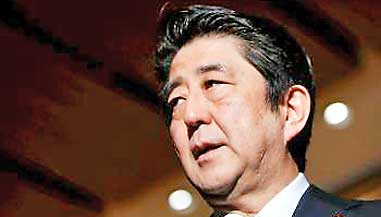Friday Feb 20, 2026
Friday Feb 20, 2026
Tuesday, 23 February 2016 00:00 - - {{hitsCtrl.values.hits}}
 Reuters: Voter support for Japanese Prime Minister Shinzo Abe slipped to below 50% in a weekend opinion poll, sending a warning signal to the government with an election less than six months away.
Reuters: Voter support for Japanese Prime Minister Shinzo Abe slipped to below 50% in a weekend opinion poll, sending a warning signal to the government with an election less than six months away.
Overall support for Abe’s cabinet slipped to 46.7%, down seven points from late January and the lowest rating in six months, according to a survey conducted by Kyodo news agency. Disapproval rose 3.6 points to 38.9% and 77.7% of the respondents said they felt the administration was “growing slack.”
Abe took office at the end of 2012 and has enjoyed unusual longevity for a Japanese prime minister. He has ridden out a series of scandals that ensnared several cabinet ministers, including last month’s resignation of Economy Minister Akira Amari – a close confidante and an architect of Abenomics – over a money scandal.
But the scandals, gaffes and now doubts about economic policy – including the Bank of Japan’s (BOJ) decision last month to implement negative interest rates – is starting to take a toll before July’s election for the Upper House of parliament.
“The decision for Amari to quit was made promptly and seemed almost clear cut, so that didn’t harm ratings so much,” said Atsuo Ito, a commentator who has written books on the mathematics of politics.
“But if a lot of other things pile up, it’s inevitable that voters get the impression the administration is growing sloppy – and I think that impression is strengthening.”
Shrinking economy
In the three weeks since Amari resigned, a lawmaker from Abe’s ruling Liberal Democratic Party (LDP) quit after revelations of an extramarital affair and Communications Minister Sanae Takaichi warned the government could order broadcasters to suspend operations if it felt they were biased, raising concerns about press freedom.
An additional blow was the release of data last week showing Japan’s economy shrank more than expected in the final quarter of last year as consumer spending and exports slumped.
The BOJ’s decision rattled respondents in the survey, with 82.2% expressing unhappiness about it, which Ito said should really be taken as a measure of feelings about Abenomics as a whole.
“The scandals are one thing, but it’s the economy that really has the government rattled,” Ito said, noting that the economy was likely to be the trump card in any decision over the timing of a snap election. Speculation has been simmering for months that Abe might dissolve parliament’s lower house and call a snap election, with scenarios including a lower house poll in April, an election for both houses in July or a snap poll in December.
Koichi Nakano, political science professor at Tokyo’s Sophia University, said the slip in Abe’s support could, perhaps counter-intuitively, encourage him to call a snap election sooner rather than later, before support for his cabinet slides further and while the opposition camp is still in disarray.
Overall support for the largest opposition party is languishing at 9.3%.
“If polls in another month show a bit of a shocking decline, then that might be the moment to decide what to do (about a snap election),” Nakano said.
“If it’s another seven points, he might say he cannot call a snap election but if it’s three points or less, he might do it, knowing more bad news is coming.”